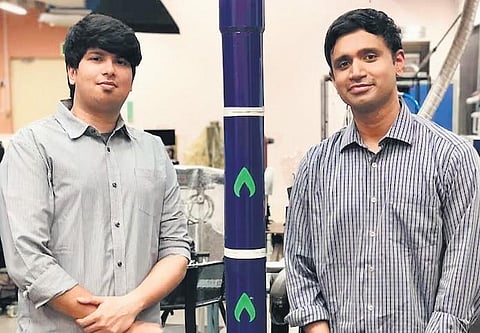

CHENNAI: Chennai-based space tech startup Agnikul Cosmos is attempting cheaper and faster space transportation for smaller satellite operators. After multiple fundraising pitches, its co-founders Srinath Ravichandran and Moin SPM mastered cutting rocket jargon and used ride-sharing and OTT analogies to describe their technology and work.
They now plan to send affordable orbital class rockets for micro and nano satellites within a short time frame of 15 days.“We are attempting on-demand launches, basically no ride-sharing. The launches will be mission-specific, driven by individual demand,” said Moin SPM. Usually, big rockets offer competitive prices due to volume advantage. But, small satellite players are priced the same, irrespective of the weight. Explaining the market demand for sending small satellites independently, he said satellites weighing less than 100 kg are typically charged at the rate of $60,000- 70,000 per kg.
However, it is an unconventional business as there are a lot of uncertainties around when and how satellites will be launched. Also, there could be compatibility issues with interference from other satellite systems.
“It is like a crowded bus and you don’t know when you will be pushed out. Also, bigger vehicles take you to a particular orbit, but it may not be your destination. You have to take in-space propulsion, and space tug to reach the final destination. You have to spend on launch, space tug and ride-sharing aggregators,” said Moin.
According to Ravichandran, there is a clear need for people who want to control the time of the mission. He said their service will be priced much lower than the current scenario.
The IIT Madras-incubated startup has so far raised USD 41 million in four rounds and is gearing up for two development launches - to validate and improve its rockets. The first launch is expected by the end of this year and the commercial rocket liftoff by the second half of 2024.
The duo decided to launch private rockets for small satellites in 2016 when there was no regulatory approval or a clear policy.
Since space tech is known to be capital-intensive, convincing investors is a tough task. So, they decided to be capital-efficient and innovate. They developed 3D printing of semi-cryogenic engines as a single component consisting of igniters, injectors, cooling channels, combustion channels, and nozzle mounts, thereby avoiding the traditional way of using thousands of components.
The startup also opened the country’s first private launching pad and mission control room at Sriharikota near ISRO’s facility last year. They collaborated with IIT Madras and ISRO and received a Flight Termination System from ISRO, the first time a PSLV package was delivered for a private vehicle. Innovation on tech has cut cost and time compared to conventional manufacturing of rocket engines, said Ravichandran, who is also the chief executive of the firm. Agnikul rockets will be ready in two weeks (it would take 12-16 weeks in a conventional process) and also save 8-10X in costs, according to its founders.
“What we’re attempting is very different. It is not a sounding rocket; it is called a vertical ascent control vehicle. It lifts off vertically and goes to a certain height. Just like PSLV or GSVL, it will continue to track predetermined paths. The business case for us demands vertical controlled ascent,” said Ravichandran.
After a developmental launch, they plan to study the results and optimise the performance and currently signed letters of intent with satellite operators. The market for smaller sats is growing at a compounded annual growth of 17.3% and may touch $9 billion by 2030, according to various market research reports.